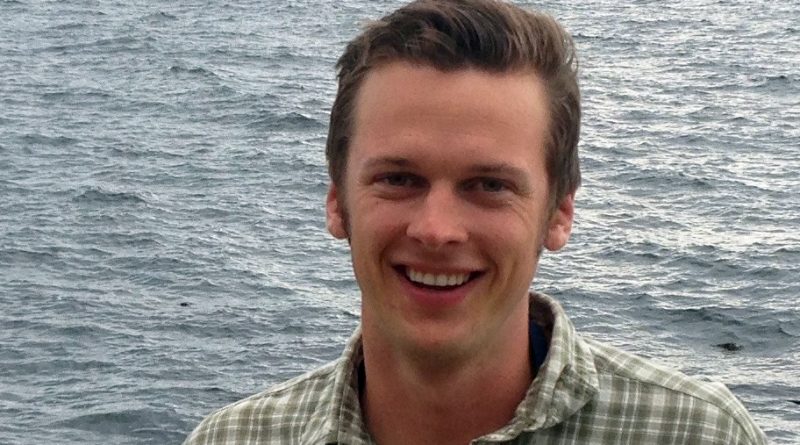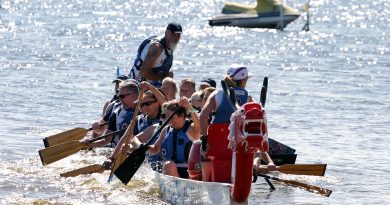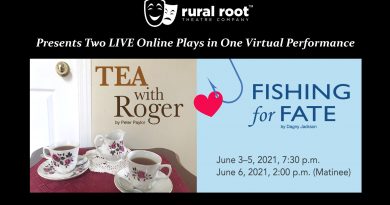Kinburn’s Twardek awarded scholarship
By Jake Davies - West Carleton Online
KINBURN – PhD student William Twardek was awarded the $10,000 Polar Knowledge Canada POLAR Scholarship June 16 for his work studying the challenge the Whitehorse Dam creates on spawning Yukon River chinook salmon.
Twardek, 25, is a Panmure Road resident who is in the second year of his four-year doctorate program in biology at Carleton University.
The Arnprior District High School graduate received his bachelor’s degree in biology from Queen’s University before moving to Carleton where he also received his master’s degree. He’s in his eighth year of post-secondary school.
Twardek spoke to West Carleton Online yesterday (June 23) about his research and the award. From an early age the Kinburn native had an appreciation for the great outdoors.
“I always liked going on canoe trips with my family,” he said. “Fishing with my friends. I always thought if I could get a job where I spent part of my time outdoors, I would be happy.”
The more time he spent on the water, the more interest he had in biology and vice versa.
“That increased more and more,” Twardek said. “I enjoyed being on the Ottawa River or in Algonquin Park.”
For the last two years, Twardek has been spending his summers on the Yukon River. Near the Whitehorse Dam to be specific, which of course can be found in Whitehorse, YK.
He’s there studying the chinook salmon and the challenges the species who make that river their habitat are having trying to spawn.
The Whitehorse Dam was built in 1958. That obviously was an impediment for the salmon searching for their spawning grounds. So, The Yukon Energy Whitehorse Fishladder and Hatchery was built the year after the dam was completed.
“The only way around the dam is a long, wooden fish ladder,” Twardek said. “Basically, think of it as a long channel around the dam.”
It’s about two metres wide and 350 m long. It only goes one way for the salmon to lay their eggs. Juveniles must go through the spillway or through the turbines to get back down the river.
“We know from all the studies done around the world, there is a lot of mortality, but not 100 per cent,” Twardek said of the fish’s survival rate on the dangerous way home.
“I’m looking at how many adult fish are able to find the ladder,” Twardek said. “It’s a small opening. A rather unusual method for fish to use. It varies, but a good estimate of how long it takes the fish to bypass the dam is around five hours. The low end is two hours. We’ve seen fish swim up to the entrance, not know they are supposed to use it, spend a couple of hours and then swim back downstream.”
Part of Twardek’s study is finding out the proportion of Yukon River salmon using the fishladder.
“We find a lot of dead fish downstream,” Twardek said. “All salmon die after spawning. We find a very, very high number of fish not able to spawn. They’re dead with bellies filled with unfertilized eggs. It’s a significant number of fish and it’s not something we’re seeing in other areas where the salmon don’t need to pass a dam.”
It’s a depressing end for a long migration for these salmon. They come from the Bering Sea to the west coast of Alaska; then north to the Yukon border; and then south to the Yukon River.
“It’s the longest salmon migration on earth,” Twardek said. “The salmon I’m studying in Whitehorse, before the dam, there were 10s of thousands of fish providing food to hundreds of families. Last year there were 260. The worst run in 40 years. No one can fish them anymore. It’s fairly alarming. The aim of the work is to identify solutions to improve the stock.”
It was that work that earned Twardek his scholarship, part of the $95,000 2020-2021 Association of Canadian Universities for Northern Studies (ACUNS) Awards and Scholarships program. The program offers up to 18 prizes each year to Canadian post-secondary students in support of northern research in all disciplines. Award recipients must demonstrate academic excellence, leadership and a commitment to northern communities.
“These sorts of awards are invaluable,” Twardek said. “When you are in school for this long, you’re not making a lot of money. It also gives you that sense of optimism your work is important.”
Twardek spends two to three months in Whitehorse from mid-July to mid-September. Although schools were closed at the outset of the pandemic, Twardek was able to finish the year, but does not know if he will be able to continue his research this summer.
“It’s a bit uncertain right now due to travel restrictions imposed due to the pandemic,” Twardek said. “We were able to finish the semester online. A lot of what I do can be done on my laptop. But I need to be in the Yukon to collect data.”
And the salmon only spawn once a year in August.
“ACUNS recognizes the impact the COVID-19 pandemic has made on students,” ACUNS President Gary N. Wilson said. “For northern studies scholars, whose research projects involve on-the-ground collaboration within Canada’s Arctic and sub-Arctic communities, summer is the critical time to get work done. The season may be lost this year, but academic ambitions should not be abandoned. We hope our scholarships will provide the means of support to help our recipients reach their goals.”












